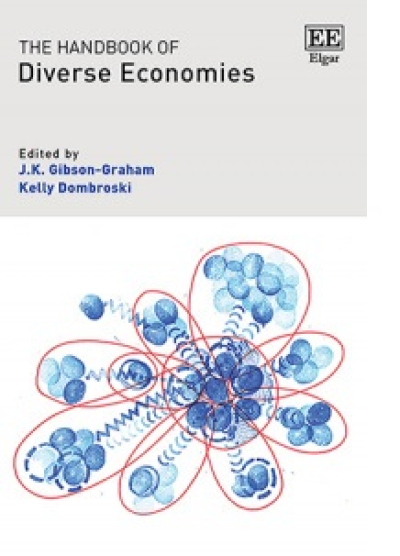New Video on the Community Economies YouTube Channel

In early May 2021, Dr Demet Dinler and students from the Radical Theories in International Development reading group at the University of Sussex organised an online launch of the Handbook of Diverse Economies.
The launch involved a question and answer session with one of the editors of the Handbook, Katherine Gibson. The video of the event is now available through the Community Economies Institute’s YouTube Channel by clicking here.
In her introductory remarks, Dr Anke Schwittay from the School of Global Studies at the University of Sussex commented on how her approach to teaching and research had been influenced by the work of J.K. Gibson-Graham and especially the provocation to become an ‘academic subject of possibility.’ In her closing remarks, Dr Schwittay highlighted that the Q&A session had been a wonderful demonstration of how to be an academic subject of possibility.
The first part of the Q&A session was based around three questions for Katherine Gibson that the reading group had come up with.
Professor Gibson was invited to reflect on her intellectual journey and the early development, with Professor Julie Graham, of the concept of diverse economies.
She was then invited to reflect on why and how the concept of diverse economies, and Gibson-Graham’s work more broadly, has had such an impact on shaping academic debate in diverse fields including economic geography, anthropology, development studies and political economy.
Here Katherine Gibson drew on Donna Haraway's response to J.K. Gibson-Graham's early work, The End of Capitalism (As We Knew It).
“Haraway said that she felt as if an iron brace had been released and she could breathe again. This type of response is indicative of how the theories that we use to try to understand the world can become more and more constraining of creativity and possibility, and make it impossible to take even the first step towards making a positive difference.”
“The concept of diverse economies, and related concepts such as community economies and capitalocentrism, provide an antidote by opening up possibilities and providing concrete thinking tools that can be used to find ways forward in a world that can seem to be full of problems and therefore impossible to change.”
For the final question in this part of the Q&A, Katherine Gibson was asked to tell the story of how the Handbook came about, and what it was like to edit a book with 58 chapters and 66 authors.
In the second part of the Q&A, she answered questions posed by members of the audience. One theme was about where the impetus for social transformation comes from and how academic ideas can be translated into topics for everyday conversations with families and friends, including in contexts in which people are living comfortable lives.
Another theme was about strategies for sustaining a sense of hope, especially with COVID-19 having such devastating impacts in countries in which elected governments are not hearing or supporting their citizens during this crisis.
There were also questions about teaching, including strategies for teaching differently so that students are not overwhelmed by learning about the problems in the world but are also able to appreciate the types of interventions that are being developed.
How to conceptualise the world outside of a capitalocentric framing was also a theme, and Professor Gibson urged participants to not bundle all sorts of different processes and practices together as ‘capitalism’ but to take a more empirical approach to interrogate the micro-politics and practices that might be occurring, and to also try to find the possibilities that are already present.
Selected chapters from the Handbook are available here, and short excerpts are featured on the Community Economies Institute LinkedIn page.
Anke Schwittay has recently joined the Community Economies Research Network, while Katherine Gibson is one of the founding members.
The Community Economies Institute YouTube Channel can be accessed by clicking here.
The artwork on the cover of the Handbook of Diverse Economies is by Ailie Rutherford.
Jenny Cameron
